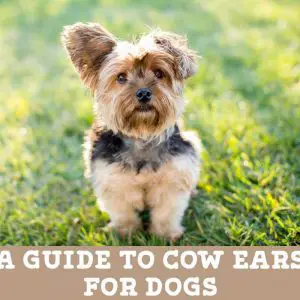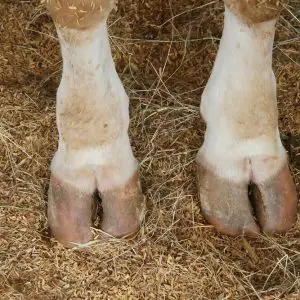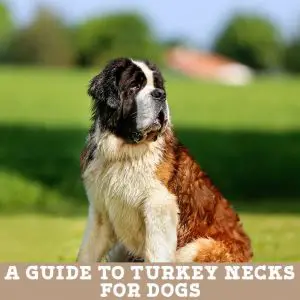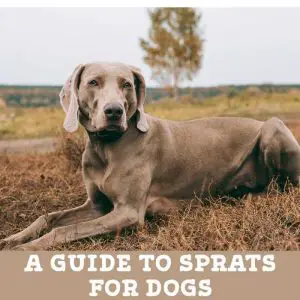Do you have a medium or large breed dog which is a big chewer? Maybe they get through a normal chew in a matter of minutes? Are you looking for something natural which will keep them entertained for hours? Maybe you should consider beef snouts.
In this article we will discuss their benefits and downfalls, as well as whether they are safe and will suit your dog.
Key facts
Beef snouts benefit dogs by improving dental health and joint health, as well as plenty of chewing time.
Beef snouts should only be given to medium or large breed adult dogs with strong jaws, as they are very tough to chew.
Beef snouts are not suitable for dogs with beef allergies.
They can also become dangerous when they get small enough to swallow, as they are not very digestible and therefore could cause blockages.
Some alternative natural options for beef snouts include antlers, bully sticks, ostrich tendons and chicken feet.
What are Beef Snouts?
Beef snouts are the noses of cows. You might have heard of pig snouts being fed to dogs before, but beef snouts are somewhat more of a speciality.
There is a lot of variation between beef snouts prepared for dogs, and there is not a set way in which they are prepared. Some are extremely natural, having just been air-dried. Others are dehaired via hot water or shaving, then dipped in sodium hypochlorite to clean them, before drying them.
In addition to this, they can also be cut in several ways. Some beef snouts are simply the tip of the nose, which is mainly cartilage and skin (hide). Others still have a lot of dried meat still attached. And some still also have the hair on them.
The benefit of the meaty version is that they are more than just a chew and provide a substantial amount of protein. However, the ones without meat attached simply contain cartilage, which even though has some health benefits, is not very nutritional.
Beef snouts are by-products of the meat industry and prevent that part of the cow from going to waste. Most snouts in the UK are sourced from mainland Europe, from countries such as Switzerland. In the US, snouts are usually sourced from the US or Dominican Republic.
Benefits of Beef Snouts for Dogs
Key benefits
Dental Health
A big, thick, tough chew that’s great for bigger dogs.
Joint Health
A natural source of chondroitin, a common ingredient in joint supplements.
Oral Health
Beef snouts are extremely thick and chewy, so they are great for dental health. They take a long time to chew through and the chewing action helps to remove tartar from the teeth and keep them clean. This is the same principle that many dental chews have adopted, except that beef snouts are much tougher and take a long time for a dog to finish. It is because of this that they are not suitable for smaller dogs.
Joint Health
Beef snouts are mainly made up of cartilage, which is full of collagen. This is a natural source of chondroitin which is one of the components of joints, and a common ingredient of joint supplements. Therefore, dogs which have poor joint cartilage due to osteoarthritis, or that are heavy wearing on their joints, such as working or sporting dogs, may benefit from the occasional beef snout.
However, there are no scientific studies quantifying the amount of chondroitin in a beef snout, and as with all-natural products, there are often major differences in concentration from one individual product to another. Therefore, joint supplements are a more superior choice for a guaranteed, clinically-approved dose of chondroitin.
Nutritional Information for Beef Snouts
Beef snouts are more nutritional the more meat there is on them. However, most are not prepared with the meat still on, and therefore will not provide your dog with a meal; simply a nice chew treat.
The normal style of beef snout without the meat has the average nutritional make up:
Nutrients & Compounds
Therefore, beef snouts are mainly made up of protein, and they are relatively low in fat. This means the little nutrients they do contain, are in fact quite healthy for your dog.
Calories
The jury is still out as to how many calories a beef snout contains, however since they are slow to be ingested, difficult to digest, and most of the nutritional make up is protein, it means the digestible carbohydrate content (which contributes to calories) is relatively low for the size of the treat.
Feeding Guide
Beef snouts should be fed as an occasional treat rather than a daily occurrence due to their size, and several times a week will allow your dog to see the health benefits from them. If your dog is small, you may wish to avoid them as they will be too large and too tough for them. But a medium to large sized dog will enjoy them as an occasional treat, or meal if they have meat on them too.
Remember, that even though they aren’t extremely high in calories or fat, treats should be avoided in overweight dogs, and if your dog is a normal weight, some food should be removed from your dog’s daily allowance to account for the calories.
Downsides & Risks of Beef Snouts for Dogs
Small Risk of Intestinal Blockage
While generally considered safe, if large pieces are broken off and swallowed they could cause intestinal blockage. Even a voracious chewer would find it difficult to break off chunks, but supervision would mitigate the risk.
Intestinal Blockage
Beef snouts are generally considered a safe treat, as long as large pieces are not ingested whole. The hide that it contains is relatively undigestible, which means that large pieces won’t shrink in the stomach and therefore could cause blockages when they get into the intestines. However, beef snouts are very tough and thick, which means it is pretty difficult for your dog to break off chunks.
This risk can be mitigated by ensuring your dog is supervised when chewing the treat, and when it gets small enough to swallow whole, remove the last bit.
Beef Allergies
In addition to this, beef snouts are not a suitable option for dogs with beef allergies. Proteins are what dogs react to when they have allergies, and beef snouts are mainly made up of beef protein. As a result, your dog with a beef allergy might develop diarrhoea or a skin flare up.
Not For Small Dogs
While beef snouts pose no additional risk to smaller dogs, the chances are they will be too big and too tough for them to enjoy. You may want to source a different chew.
Around the House
If dog treats were given rankings of how smelly they were, beef snouts would be very near the top. They are pungent! Of course, this makes them extremely attractive to dogs, but they are certainly not treats that you will enjoy having in the house.
In addition to this, once your dog has chewed and made it moist, some of the darker beef snouts might leave marks on your carpet.
Therefore, they are better suited to supervised outdoor times!
Beef Snouts for Puppies

Beef snouts are not the most ideal treats for puppies since they are thick and tough. A puppy will be too small, with too weak of a jaw to really get the full benefit of them. They are best suited for medium and large breed adult dogs who are heavy chewers with strong jaws.
Therefore, it is best to wait until your puppy is reaching his first birthday before you start offering him beef snouts.
Alternatives to Beef Snouts
Do you like the sound of beef snouts but not completely sold on them yet? Why don’t you try one of these alternatives?
- Antlers: Antlers provide a tough natural treat for chewing on, without the risk of blockages as they do not splinter or break, nor are they are ingested. They help improve dental health in a similar manner to beef snouts. Just remember to remove the antler when it has been ground down to a small enough size to be swallowed.
- Ostrich tendons: These are not quite as tough as beef snouts, but still an exceptional option for improving dental health. Ostrich tendons create fibres when chewed on for a while, which acts like dental floss for a thorough clean.
- Bully sticks: These controversial treats provide plenty of chewing time as well as a way of improving dental health. However, they are high in calories, so be aware that you will need to remove quite a considerable amount of food from your dog’s daily ration to balance it out.
- Chicken legs: While these don’t provide any chewing time at all, as they are gone in a matter of two crunches, they do contain plenty of cartilage to help improve joint health like beef snouts.
FAQs
Beef snouts provide a great treat for dogs to improve their dental health, especially large dogs that are strong chewers. They can also aid in the improvement of joint health.
A medium to large sized dog can have a beef snout as an occasional treat, or meal if they have meat on them too. Avoid giving them to a small dog.
Beef snouts are generally considered a safe treat, as long as large pieces are not ingested whole. Beef snouts are also not a suitable option for dogs with beef allergies.
If dog treats were given rankings of how smelly they were, beef snouts would be very near the top. They are pungent! Of course, this makes them extremely attractive to dogs, but they are certainly not treats that you will enjoy having in the house.
Beef Snouts don’t commonly cause diarrhoea in dogs as they are not particularly rich or fatty. Nevertheless, in rare cases, the ones which have not gone through a sanitisation process can contain bacteria which could upset your dog’s stomach.
In addition to this, they do contain beef protein, and therefore if your dog is sensitive to beef, they might develop diarrhoea. If fed in moderation, most dogs tolerate beef snouts very well.
Beef snouts can cause a blockage if a large chunk is swallowed whole. In addition to this, it can also be a choking hazard if it gets lodged in the neck or throat. This is because hide is undigestible. The good news is that it is very difficult to chew through, and therefore the chances of a chunk coming free is very slim. To keep your dog safe, always make sure you watch your dog as he chews a beef snout and take away the last bit when it becomes small enough to swallow.
Beef snouts are by-products of the beef meat industry, which ensures no part of the animal goes to waste. The cows can come from a variety of farms with varying levels of welfare and animal husbandry, and therefore, always make sure you buy dog treats where the product can be traced back to the farm.
Beef snouts are not the most ideal treats for puppies since they are thick and tough. A puppy will be too small, with too weak of a jaw to really get the full benefit of them.









